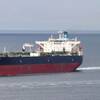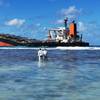Half of Hanjin Boxships Denied Port Access
Of 98 container ships, 44 blocked from ports. U.S. firms take legal action over unpaid bills.
Roughly half of Hanjin Shipping Co Ltd's container vessels have been blocked from ports since the South Korean firm's collapse, putting manufacturers and their customers increasingly on edge about the fate of cargo and spikes in freight costs.
Woes for world's seventh-largest container shipper have only deepened since its banks withdrew support and it filed for court receivership this week. One vessel has also been seized by a creditor in Singapore while firms in the U.S. have launched legal action against Hanjin to seize vessels and other assets over unpaid bills.
The potential for cargo to be stranded, perhaps indefinitely, is unnerving for many - particularly as industry insiders and analysts believe that Hanjin has little chance of being rehabilitated and its assets will eventually be liquidated.
"The biggest problem is what is going to happen to cargos at sea. We are just praying that our cargos are not seized," said Ra Kyung-moon, executive vice president at Forman Shipping, a freight-forwarding firm in Seoul.
Freight-forwarding firms, which organise shipments, may be held liable for customer cargo that doesn't arrive and are also worried about the recovery of funds paid to Hanjin in advance for services promised.
Some manufacturers are drawing up contingency plans while the U.S. Retail Industry Leaders Association has called on Department of Commerce and the Federal Maritime Commission to take action to minimise disruption.
A Hanjin spokeswoman told Reuters that 44 of its 98 container ships had been denied access to ports including Shanghai, Sydney, Hamburg, and Long Beach, California.
These include instances where lashing firms have refused service, or where port authorities have blocked entry.
But service for Hanjin ships resumed at South Korea's main ports of Busan and Incheon on Friday after the government said port authorities would guarantee payments for service providers.
On Thursday, a Korean trade group said about 10 Hanjin ships were effectively seized in China. Hanjin said on Friday that number was incorrect.
SHIPPING COSTS SOAR
Freight rates have also surged. Hanjin's collapse has come during the shipping industry's busiest season ahead of the year-end holidays.
"The cost of shipping is now jumping through the roof and carriers are filing requests for a full increase in rates from Sept. 1," said Paul Tsui, managing director of the Janel Group in Hong Kong, a freight forwarding and logistics firm.
He added that air freight volumes would probably rise to replace urgent orders stranded in ports or at sea.
Hanjin accounts for 7.8 percent of trans-Pacific trade volume for the U.S. market and has a global client base. Of 8,281 owners of goods to be transported as of late August, 847 were South Korean firms, according to government data.
This week, a judge in California ordered the arrest of the Hanjin Montevideo container ship in Long Beach over unpaid fuel bills totaling $488,750 owed to World Fuel Services, according to court documents seen by Reuters.
Lawyers acting for two other firms, Hastay Marine and Montemp Marine, applied on Aug. 31 to a court in California to have Hanjin's assets in the U.S. including cash and property totaling more than $3 million seized to pay outstanding rental payments on two Hanjin ships, court documents showed.
Adding insult to injury, Hanjin has also been suspended from the CKYHE shipping alliance, which includes China COSCO , and Evergreen Marine Corp Taiwan Ltd.
A South Korean court has ordered the start of rehabilitation proceedings and set a Nov. 25 deadline for the carrier to submit a plan, appointing Hanjin Shipping CEO Suk Tai-soo as trustee.
Hanjin's shares, suspended since plunging 24 percent on Tuesday, will resume trading on Sept. 5, the stock exchange said.
By Joyce Lee and Keith Wallis










